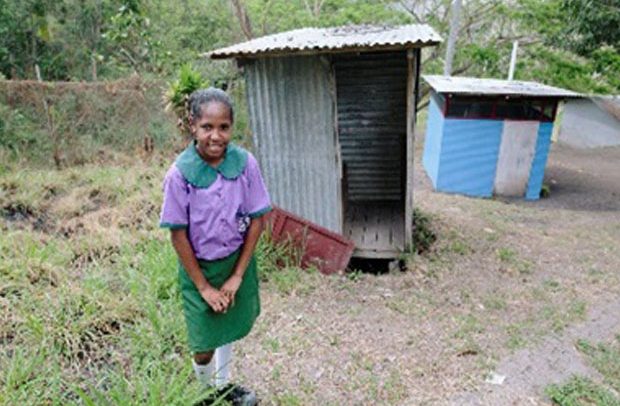A school girl standing in front her school toilet
Ghana is still ranked among the 10 countries with the lowest access to decent household toilets, a WaterAid’s annual analysis of the world’s toilet has said.
According to the fourth annual analysis labelled ‘The Crisis in the Classroom’, Ghana is still among the 10 countries with poor sanitation access, ranking seventh and sharing the position with Togo and Benin.
The report further indicated that about 86 per cent of the Ghanaian population lack basic sanitation and 31 of schools in the country are without sanitation.
Guinea Bissau on the coast of West Africa tops the table for worst in the world for school toilets, while Ethiopia remains the nation with the highest percentage of households without decent toilets.
WaterAid’s fourth annual analysis of the world’s toilets also highlights that one in five primary schools and one in eight secondary schools globally do not have any toilets.
According to WaterAid, the situation threatens the health, education and safety of over 10.6 million children in Ghana.
A shocking one in three of the world’s schools lack adequate toilets,compromising children’s human rights to sanitation and leaving them to either use dirty, unsafe pits, go in the open, or stay at home.
This means children are dangerously exposed to illnesses that could kill them. Repeated bouts of diarrhoea increase their chances of being malnourished, and sanitation-related illnesses result in missed school days and the loss of potential.
Regional Figures
In sub-Saharan Africa, an estimated 344 million children do not have a decent toilet at home, meaning their communities are polluted with human waste.
Ethiopia tops the table at an astonishing 93 per cent of households without a decent toilet, leaving children vulnerable to diarrhoea and intestinal infections.
Some countries, however, are making decent toilets in schools a priority. Over half of schools in Bangladesh now have a decent toilet and shared toilets in slum areas are providing a stepping stone to better health.
Mohammed Abdul Nashiru, WaterAid’s Country Director, said children in every part of Ghana need access to safe toilets at home and at school, adding that their health, education and safety depend on it.
“Every child should be able to go to the toilet safely and with dignity whether they are at school or at home. Bringing safe toilets to the one in three schools worldwide with no adequate toilets should be a top priority – along with bringing decent household toilets to the 2.3 billion people still waiting,” he said.
Abdul Nashiru opined that progress towards any of the UN Sustainable Development Goals (SDGs) will not be possible without clean water, decent toilets and good hygiene.
“If we are serious about all children and young people, wherever they are, whatever their gender, physical ability or community background, having their right to clean water and sanitation, we must take decisive and inclusive action now,” he stressed.
He, thus, called for increased investment in sanitation for all and ensure an integrated approach and improved transparency in monitoring and reporting.
School sanitation must be inclusive, enabling children with disabilities to use clean, safe, accessible toilets at school as well as meet the specific needs of girls in order to ensure their privacy, safety and dignity.
By Jamila Akweley Okertchiri


